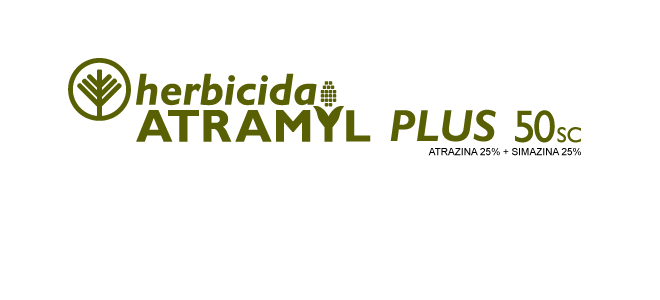
Composition:
| Atrazine 6-chloro-N2-ethyl-N4-isopropyl-1,3,5-triazine-2,4 diamine | 25 % (w/v) |
| Simazine 6-chloro-N2, N4-diethyl-1,3,5-triazine-2, diamine | 25 % (w/v) |
| Inert | 50 % (w/v) |
Chemical Group:
TRIAZINE
Formulation:
SUSPENSION CONCENTRATE (SC).
All the SC formulations (Suspension Concentrate) must be shaken before dosage to avoid decantation at the bottom of the container.
Overview:
ATRAMYL50 SC PLUS performs a forceful weed control, since it is an herbicide that joins the efficiency of 2 main actives, atrazine and simazine, to obtain efficiency and better residual effect. Indicated for weedy lots with broad and narrow leaves, it can be used for both pre-emergence and post-emergence up to the 5th leaf (weed and crop).
Application method:
The application can be via air or land.
Phytotoxicity and compatibility
Corn and Sugar cane crops are naturally resistant to this product, but not sorghum. Due to this, is not recommended its application in pre-emergence. From 15cm height it becomes viable the post-emergence application. Under cold conditions or heavy rain, after the product application, this can damage the sorghum grains whichever the type of soil is. Mixtures with chlorpyrifos can increase the phytotoxicity risks, mainly in applications carried out on cloudy days. Vegetables, soybean, corn and potato are sensitive to atrazine. The product in incompatible with highly alkaline substances.
Re-entry time to the area of treatment:
1 day. If the re-entry is necessary before term, do it by employing personal protective equipment.
Toxicological Class:
Class III – Blue stripe.
Antidote:
There is no specific antidote.
Packing:
Container of 20 lt
Directions for use:
Light Soil:
Dose: 4,0 l/ha
Medium Soil:
Dose: 5,5 l/ha
Heavy Soils:
Dose: 7,0 l/ha
Time of application: pre-emergence
WP (days): 45
Dose: 5,5 l/ha
Grasses up to 2 leaves and broad leaves up to 3 leaves.
Dose: 7,0 l/ha
Grasses larger than 3 leaves and before tillering and broad leaves between 3 and 4 leaves.
Dose: 9,0 l/ha
Grasses in tillering and broad leaves larger than 4 leaves.
WP (days): 45
Bristly starbur / Acanthospermum hispidum
Ageratum / Ageratum conyzoides
Carb White / Alternanthera tenella
Large fruit Amaranth / Amaranthus deflexus
Green Amaranth / Amaranthus hybridus
Spiny Amaranth / Amaranthus spinosus
Slender Amaranth / Amaranthus viridis
Cobbler’s Peg / Bidens pilosa
Marmelade grass / Brachiaria plantaginea
Wild turnip / Brassica campestri
Lamb’s quarter / Chenopodium album
Feather Fingergrass / Chloris virgata
Tropical spiderwort / Commelina benghalensis
Rattlebox / Crotalaria sphaerocarpa
Fierce Thorn Apple / Datura Ferox
Thorn Apple / Datura stramonium
Florida beggar weed / Desmodium tortuosum
Goosegrass / Eleusine indica
Red Tasselflower / Emilia sonchifolia
Redstem Filaree / Erodium cicutarium
Wild Spurge / Euphorbia heterophylla
Gallant Soldier / Galinsoga parviflora
Spikenard / Hyptis lophanta
Wild Spikenard / Hyptis suaveolens
Hairy Indigo / Indigofera hirsuta
Common Morning Glory / Ipomoea aristolochiaefolia
Common Morning Glory / Ipomoea purpurea
Chamomille / Matricaria chamomilla
Apple of Peru / Nicandra physalodes
Sweetgrass / Panicum schinzii
Cutleaf Groundcherry / Physalis angulata
Common Knotgrass / Polygonum aviculare
Wild Buckwheat / Polygonum convolvulus
Common Purslane / Portulaca oleracea
Radish / Raphanus raphanistrum
White-eye / Richardia brasiliensis
Green Foxtail / Setaria spp
Arrow-leaf sida / Sida rhombifolia
Common Milk thistle / Sonchus oleraceus
Common Chickweed / Stellaria media
Stinkweed / Tagetes minuta
Annual Nettle / Urtica urens
Spiny Cocklebur / Xanthium spinosum
WP: Waiting Period
Downloads
237 KB


